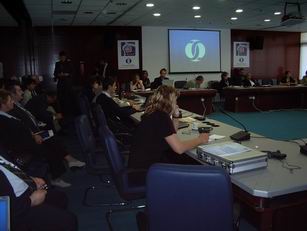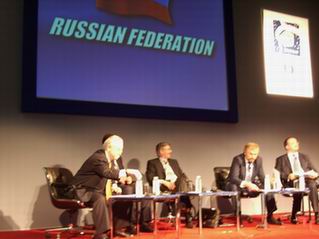Civic
Engagement Policies
of the World Bank and
European Bank for
Reconstruction and Development in Russia
Issue Paper
Liliana
N. Proskouryakova
OSI IPF Fellow 2005
The World Bank
and European Bank for Reconstruction and
Development are international
institutions that play an important role in global economic governance. They recognize the indispensability of civic
engagement for successful implementation of structural reforms carried
out with
their financial and consultative support [1]. My research concerns ways
in which that
recognition can be optimized in practice.
In the case of Russia, both formal and informal
policies of the WB
and EBRD seek to make civic-engagement principles of public
participation open
and clear, which, in turn, should contribute to wide public awareness,
understanding and support of economic development and reforms, as well as useful feedback to policy-makers.
Scale of Involvement
As of end of the
year 2003 the World Bank (International Bank for Reconstruction and
Development
and International Development Agency) portfolio in the Russian
Federation
enccomapssed 33 projects and 3 grants, constituting $9.7 billion of net
obligations of the World Bank to the Government of the Russian
Federation.
Russia
became a shareholder and a member of International Finance Corporation
(IFC) in
1993. As of June 1, 2005, IFC
invested around $2 billion of
its own funds and syndicated over $200 million in more than 100
projects across
a variety of sectors, while its committed portfolio stands at $1.404
billion.
At present, Russia commands the largest
country exposure in the IFC.
As of the end of 2002 the European
Bank for Reconstruction and Development invested EURO 4.9 billion in
Russia in
the form of direct and regional investments. 25% of all investments of
the EBRD
are made in Russia. On average the Bank invests EURO 1.2 billion in Russia.
Civil
Society
One
of the most comprehensive studies of civil society in the World – Civil
Society
Index (CSI) - was developed and implemented by the World Alliance for
Citizens
Participation (CIVICUS). In Russia the CSI
was
implemented by the St.Petersburg “Strategy” Center
using the following definition of civil
society (developed by the project National Advisory Board):
“Civil Society is an arena, situated for the most part
outside family, state and market, at which people voluntarily interact
for
promotion of their own and public interests and the common good”.
Opinions differ on the
extent to which Civil Society Organizations (CSOs) influence public
opinion and
attitudes in local communities. Whatever its advocacy positions, the
ability of
a CSO to influence public opinion depends on its capacity (human,
financial,
etc.), the political environment in its area of operation, the size of
its
membership and/or number of beneficiaries, the organization’s
visibility and
information activities, and other factors.
In other words, the ability of a CSO to influence public opinion
depends
on a complex number of factors and can be assessed only on a
case-by-case
basis.
Forms of Civic Engagement
Different
forms of civic engagement are available to international organizations
and
national decision-makers. These include,
first of all, 1) consultations to sound out the views of
various social
actors and stakeholders on issues of key importance for international
institutions and national authorities, and the creation of 2)
consultative
bodies. The latter can be standing
councils with regular meetings on current and pending programs/
projects of the
institution/ ministry, and should be based upon clearly defined
criteria for
the selection and replacement of its members, democratic mechanisms of
coordination and decision-making, and accountability to various social
groups.
Other
forms include 3) public opinion
research (though much data
may already have been gathered by governmental and non-governmental
organizations) and 4) independent public
expertise, that is, outside
experts invited to track progress in project implementation and final
post-project evaluation. Such public expertise can verify that the
project in
question has incorporated recommendations received in the course of
consultations with civil society and other stakeholders.
International
organizations and Russian officials can also organize 5) formal public hearings following individual or public
consultations on projects; audits of project results may be put forward
for
discussion. In such public hearings the role of regional authorities is
of
particular value. Furthermore, there is an option to actively pursue 6) information
dissemination to raise public awareness and make
an institution/
agency’s work understandable to citizens.
Information on international institution’s work should be
disseminated
not only by the institutions themselves, but also by CSOs that monitor
and
analyze their work, that look at their work from a critical perspective.
Finally, on the issue of
7) funding,
possible mechanisms
include sub-contracting agreements, grant agreements (договор целевого финансирования,
пожертвования), indirect funding
through a foundation created with the support of an international
institution,
or through an independent foundation; a grant agreement with the
federal or
regional government and CSOs.
What makes for Success?
- Civic engagement policies are formalized, i.e. developed
in written form and adopted at the highest possible level of an
institution/ ministry in the form of a law, a regulatory act,
operational policy, directive, and so on.
- Upon adoption, civic engagement policies become
obligatory for all officials of an institution / ministry, and
circumvention or
delays are treated as unacceptable.
- As needed, officials institute specific educational
programs and training to learn how to better implement civic
engagement policy.
- All levels of an institution/ ministry take part in the
development and implementation of civic engagement policies.
- The principle of openness is observed in the
development and introduction of amendments (review, changes and
updates) of
civic engagement policies.
- Civic engagement policies are linked and/or mainstreamed
with other key policy documents of an institution/ ministry (i.e.
corporate policies and strategies, such as with the EBRD Country
Strategy, WB Country Assistance Strategy, mid-term programs of social
and economic
development of the Russia Ministry of Economic Development and Trade,
and so on).
- Civic engagement events are organized in such a way that
various stakeholders are represented (with consideration of gender,
age, social group balance and geographic diversity or relevance). All
participants are equal and free to express their opinions and positions.
- Special budget
and other resources are
previewed for civic engagement activities.
Some Practical Tips
- International institutions and
national authorities may opt to keep CSO databases of their own and
regularly
updating them, or use existing databases. In either case it may be
useful to
request contact information of organizations by sector/region from NGO
resource
centers or from national/regional umbrella organizations.
- It is inadvisable to contract
CE events to a commercial company, which on some occasions has hard
times
finding common language with both civil society organizations and
authorities.
- Translations of project
documentation into Russian should be double checked for accuracy.
- Internal
Compliance Mechanisms
of international organizations should be adjusted to be able to deal
with
complaints of civil society organizations and citizens.
- At meetings, if the Moderator
has a preliminary predetermined list of presenters/speakers, the
procedure of
composition of this list should be clear to all participating
CSOs.
Participating CSOs should be informed in
advance of this procedure. Alternatively, this could be openly
discussed at the
beginning of the meeting.International
organizations may
be willing to launch a more active consultation process with civil
society
under the leading role of Resident/Country Offices, in addition to
electronic
consultations.
- There may be 2 co-chairs at a
CE event: one from the part of CSOs and one from authorities/
international
agencies. Co-chairs may change each session, while representing various
CSOs/
networks. If agenda or a meeting is agreed with an international
agency/ authority
in advance, this should be done in an open and transparent manner.
Co-chairs should
seek to be as neutral as possible towards issues discussed.
Furthermore, CSOs that
co-chair meetings should represent both independent watch-dogs
monitors, as well
as partner-organizations of international agencies/ authorities (for
example
those who were contracted to set up civil society consultations.
- International institutions and
national authorities may opt to keep CSO databases of their own and
regularly
updating them, or use existing databases. In either case it may be
useful to
request contact information of organizations by sector/region from NGO
resource
centers or from national/regional umbrella organizations.
- It is inadvisable to contract
CE events to a commercial company, which on some occasions has hard
times
finding common language with both civil society organizations and
authorities.
- Translations of project
documentation into Russian should be double checked for accuracy.
- Internal
Compliance Mechanisms
of international organizations should be adjusted to be able to deal
with
complaints of civil society organizations and citizens.
- It is advisable to develop and disseminate
evaluation forms to participants to assess the level of their
satisfaction with
the event and identify the week spots in logistics or thematic
coverage.
Participants should be reminded to complete evaluation forms and
required time
should be previewed in the agenda to fill in the forms.
- It makes sense to pro-actively inform
NGOs from various regions and networks about possibilities to take part
in annual
meetings and other events open for public organized by international
organizations;
public hearings organized by national authorities; grant programs
organized by
international organizations and authorities. When selecting candidates
for participating
in an event (with a limited number of places) priority should be given
to
organizations that have professional analytical/ expert knowledge and
organizations representing interests of sizable social groups (has big
membership, has big network of partners in own and neighboring
countries, is a
member of a national or international network, has a sizable number of
clients/
beneficiaries).
- During the meeting it is
important to set time-limit for all interventions of CSOs. All
participating
CSOs should be treated equally in terms of time provided for
comments/questions
irrespective of the relative importance of an issue.
- Giving the CS participants of
CE events to set up the agenda is great. However, it is no good if one
civil
society group monopolized the agenda and the process. Inviting up to 5
competent
and strong international, regional or network organizations will give
the CS
participants an opportunity to drive the agenda setting both time wise
and
thematically.
___________________________________________________________________________________________________________________
[1] An excellent
rationale for inclusion of civic engagement in global economic
governance can
be found in “Democratizing the Global Economy. The Role of Civil
Society”, a study based on interviews with over 200
various civil society organizations in seven countries, including
Russia, and
written by Jan Aart Scholte, Director of the Centre for the Study of
Globalisation and Regionalisation, University of Warwick
[CSGR's HomePage -
Research - Projects].
Back to HomePage

